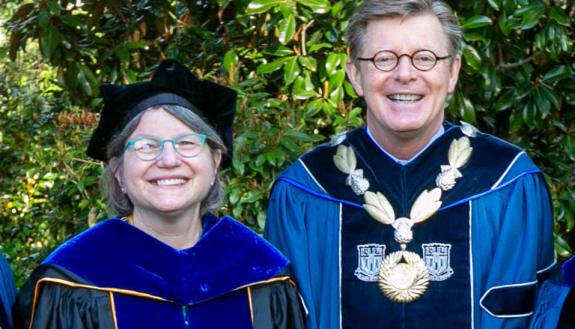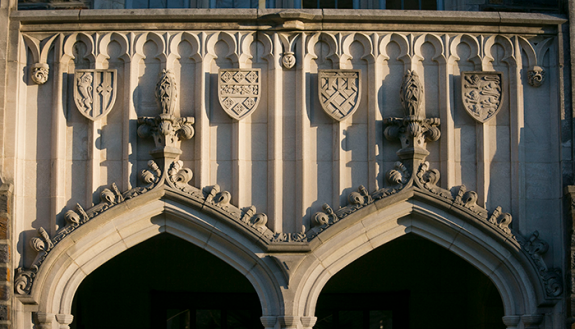From the Lab to Provost: Sally Kornbluth Looked to Help People Excel
As she heads to MIT presidency, Kornbluth reflects on three decades at Duke
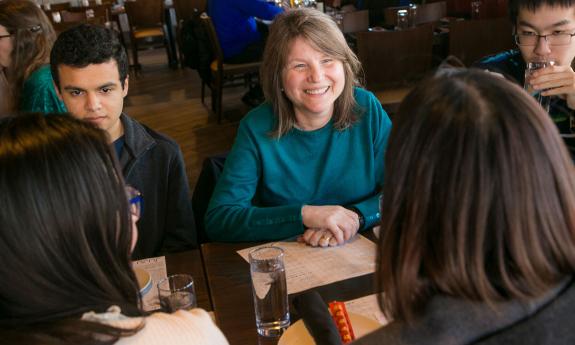
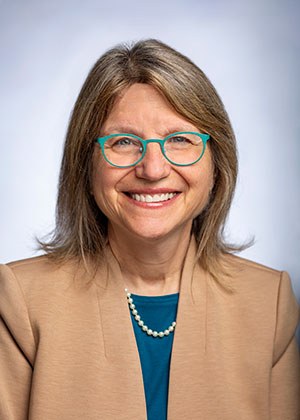
From the moment Sally Kornbluth arrived at Duke nearly three decades ago on a hot August day with “steam rising off of the sidewalk,” she set to work building a strong community of colleagues.
At first it was in her lab, where she led a team of researchers that helped her develop an international reputation as a leader in the study of the mechanisms of programmed cell death and cell proliferation.
What she didn’t know then was that the skills she developed in leading that lab would serve her well in academic administration, including the past eight years as university provost, and help her strengthen Duke collaborations and opportunities in every part of the university community.
“From the very start of my career, my success was based not just on good ideas, but on getting the right people assigned to the right projects, figuring out how to motivate them, keeping their morale up when experiments weren’t working (which was most of the time), to really cheer them on when things were working, and to tease out good ideas when we saw them, not letting them get them locked away in the parking lot of territoriality,” said Kornbluth, whose eight-year tenure as provost ends at the end of the year when she leaves Duke to become the 18th president of Massachusetts Institute of Technology.
Praise from Colleagues
As Sally Kornbluth prepares to leave Duke, colleagues shared memories and thoughts about her contributions to Duke and what it was like to work with her.
“The Sally we know [is] an academic leader—of the highest order. A colleague—the best one could hope for. A friend, a confidant, a clear voice, always with a huge smile, surrounded by laughter—and our admiration,” said President Vincent Price.
In interviews, current and former colleagues cited that attention to building community as one of Kornbluth’s legacies, one that has made Duke a better university.
“There is no way that Duke could have made the strides that it has in faculty diversity if not for her leadership and her team,” said Valerie Sheares Ashby, former dean of Trinity College who now serves as President of the University of Maryland, Baltimore County. “She got us the money we needed and supported us with her voice and priorities. She allowed me to hire great scholars of color in the midst of COVID. Without her, we could have made progress but not substantial gains. She helped us launch initiatives and keep them going. The university is better because of her support in those ways. Because when the faculty changes, it changes the university forever.”
Last week, Kornbluth was interviewed in her Allen Building office, with filled and half-filled boxes covering much of the floor and table as she packed up to head to Cambridge. Around the office are mementos of her collaboration with people from around the campus, from a plaque given her by her predecessor, Peter Lange, that reads “Have you consulted the faculty?” to a small wood chest built for her by Scott Gibson, executive vice dean for administration at the School of Medicine.
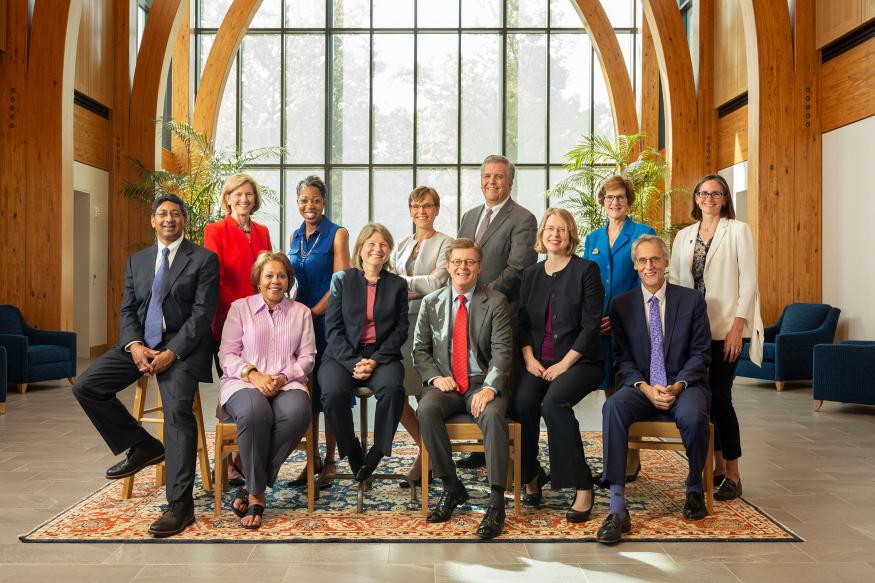
As provost, Kornbluth said she believed in empowering others to bring ideas to life, but in her achievements, there's a coherence of approach that works to advance Duke toward specific and strategic goals.
"I've always loved Valerie Ashby's comment that vision without resources is hallucination. I like to articulate a vision that is achievable. As a scientist I would look at the data and quickly pivot when I saw the results capitalizing on data to move to the next step. In administration, it's the same thing. You have to have a big goal down the road, but you also have to appreciate that there are a lot of possible paths between where you are and that goal.”
One of the areas that Kornbluth prioritized was faculty development, and the results have shown up in a stronger, more diverse faculty community. The effort was led by Vice Provost Abbas Benmamoun, whom she appointed in 2017, and the staff in the Office for Faculty Advancement. In addition to faculty career development resources and support, the office has worked to support units in furthering equitable hiring practices, with clear results: The number of Black faculty members on campus has increased from 67 in 2017 to more than 100 today.

The office also provided resources for grass-roots faculty community building projects, such as the Black Think Tank and Writing and ReseArch Productivity (WRAP) group, and seed money programs for new research projects on topics both for individual and collaborative studies.
“If you look at the many things that Abbas has put into place, things like training on having difficult conversations in the classroom and managing a diverse classroom, people have voted with their feet,” she said. “There has been great attendance, and faculty don’t go to things that they think will be a waste of their time.”
The community building has extended to student life as well. Kornbluth said she built upon the work of former provost Peter Lange and other predecessors, who developed programs such as DukeEngage and Bass Connections that had students engage with faculty and graduate students on large academic issues of importance to society.
But she added her own initiatives. As provost, Kornbluth supported the creation of the Duke Learning Innovation office, recently hiring Yakut Gazi as Duke’s first vice provost for learning innovation and digital education, to put more resources in the hands of faculty to become the teachers that they want to be.
She also built upon her own experience as an undergraduate at Williams College, an experience that inspired her to create Spring Breakthrough. That program, in which students can spend spring break studying with faculty on a leading topic without concern for grades, was emblematic of an approach that sought to integrate intellectual activity with other aspects of student life in a low-pressure environment.
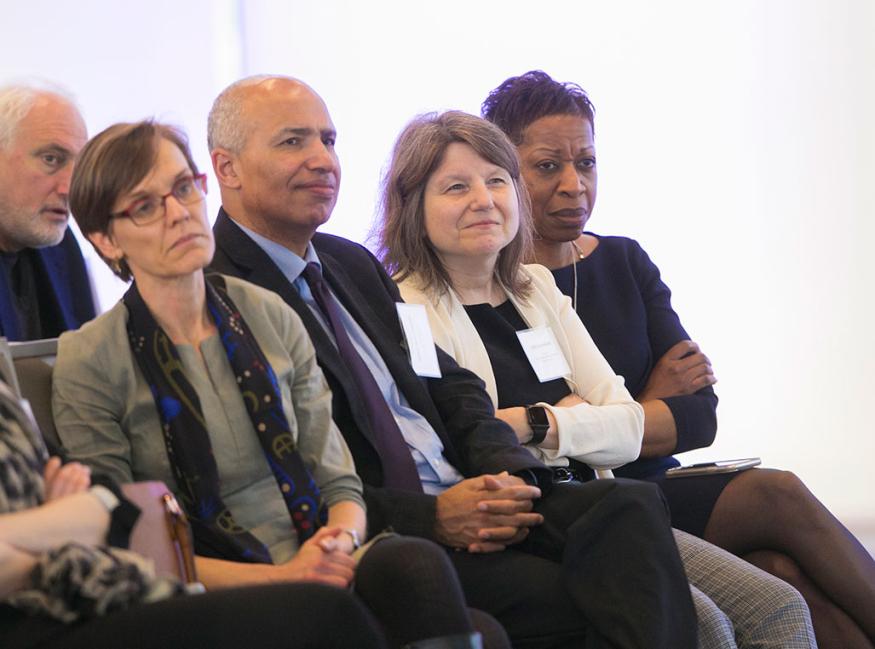
“One of the things I appreciate about Duke, and which will continue to serve it well after I leave, is that it is at the forefront among its peers in being a true liberal arts college within a Research 1 university,” said Kornbluth. “We have been innovators in undergraduate education, particularly with programs such as Bass Connections that are based on the notion of combining liberal arts education with an experiential component, and doing research as a team with faculty working in proximity to students.”
When done well, she said, the approach uses new research to enhance student learning, provides students with their own research opportunities, and brings intellectual life to where students live and play. It also strengthens the community by breaking down barriers to both learning and social opportunities.
The most prominent example of that approach is QuadEx, led by Vice Provost for Undergraduate Education Gary Bennett and Vice President/Vice Provost for Student Affairs Mary Pat McMahon.
“QuadEx infuses the student residential experience with intellectual links to their classroom experience. On top of that, it creates communities that are not based on selectivity. Getting into Duke is so competitive, we want to get away from the notion that students have to compete to have a great residential experience.
“Credit goes to Mary Pat and Gary for implementing an idea that will shape Duke for a long time going forward. QuadEx deemphasizes selectivity, emphasizes diversity and inclusion and builds a place where students’ co-curricular activities can dovetail seamlessly with their living experience. Put all these elements together, and you see a concerted effort to move the needle on the Duke experience to make it a perpetual learning environment, both in day-to-day life and in the classroom.”
That emphasis on community building was tested during the pandemic. The value of community – always acknowledged but often not at the forefront – became obvious when people were forced to go into isolation.
The pandemic changed Duke in some positive ways, she said – long-standing concerns about mental health were addressed in stronger and more comprehensive ways, and lessons learned from online education will benefit classes going forward.
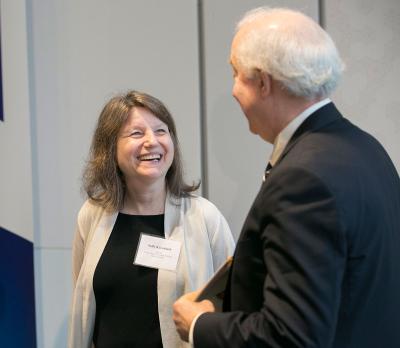
But the work of building community continues even now. In November, Kornbluth spoke before the Academic Council encouraging faculty members to keep safe but to also find ways to spend more time on campus, and reminding them of their importance as mentors and to campus life in general.
“I said that mostly thinking of the graduate and professional students. Many of the grad students didn’t see their mentors for 6-8 months. Except for a short break, labs continued during the pandemic, but in fields where scholarship is done solitarily, in libraries and elsewhere, many graduate students didn’t see people. And if they had to travel to archives or for field work, they couldn’t get some of that work done.
“We built our academic strategic plan around the notion of getting people on campus to have random collisions that could fertilize new ideas. That’s important, and the pandemic was a challenge. We’re not there yet.
“People certainly want this. I think the adaptation to QuadEx was embraced more strongly than it would have been had people not gone through the pandemic and realized what life was like without that kind of solid community for everyone,” Kornbluth said.
Kornbluth leaves Duke with her husband, Danny Lew, the James B. Duke Professor of Pharmacology and Cancer Biology, who will join her on the MIT faculty, and their two dogs. She has spent the last weeks saying bittersweet goodbyes, and she spent much of her last address to the Academic Council celebrating the colleagues and spirit of collaboration that have helped fuel her success at Duke.
“If there’s anything I’ve learned in this role, if you don’t have fantastic people to work with, faculty, staff, administrators, it is not possible to accomplish anything,” she said. “So, to the extent that I’ve been able to do anything at all at Duke, it is because of a fabulous team and great colleagues.”
